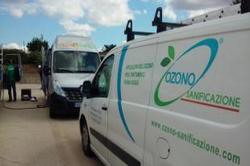The attempts made to curb the spread of Covid-19 highlight the importance of sanitation and, in particular, the role of the ozone in this field. At a time when information, suppositions and fake news are spreading, it is necessary to shed some light on real and concrete data in order to convey the right information for those working in the field at this delicate time. We discussed the topic with Daniele Simonelli of SAIM SERVICE, specialized in post-harvest technologies and ozone sanitation.
"Bacteria are micro-organisms, even if they consist of a single cell, while viruses, on the contrary, are not real living organisms and have a separate classification. It can be said that viruses are obligate parasites and, in order to survive, they need to occupy a suitable host and exploit its components to reproduce."
while viruses, on the contrary, are not real living organisms and have a separate classification. It can be said that viruses are obligate parasites and, in order to survive, they need to occupy a suitable host and exploit its components to reproduce."
On the use of ozone, Simonelli pointed out that "The choice to use ozone as a sanitizer is based on the fact that it is more effective than other chemical disinfectants, not to mention towards a wider range of pathogenic microorganisms, without leaving residues. The way ozone acts on viruses is certainly not that of destroying them by cell lysis, as in the case of bacteria, but that of inactivation. One can say that ozone acts indirectly, i.e. it helps to block the viral receptors that create the link with the cell to be invaded. This would block the viral reproduction in its first phase, that is, the cellular invasion."
In Italy, with the protocol of July 31, 1996 No. 24482., the Ministry of Health has recognized the use of ozone in air and water treatment, as a natural defense for the sterilization of environments contaminated by bacteria, viruses, spores, molds and mites. "At the company, we have been implementing ozone treatment for years now, with regard to the handling and storage of food products, as well as in water treatments - pointed out Simonelli - We have therefore developed a special brand, with specific procedures guidelines (see FreshPlaza of 09/27/2019) and we are EuOTA members."
 On the left, kiwifruit with lesions during harvesting - proliferation of contaminating mold and early ripening during the refrigerated storage phase, in the absence of ozone. On the right, the same product stored in the refrigerator with ozone atmosphere - healing effect on surface lesions and absence of contaminating mold.
On the left, kiwifruit with lesions during harvesting - proliferation of contaminating mold and early ripening during the refrigerated storage phase, in the absence of ozone. On the right, the same product stored in the refrigerator with ozone atmosphere - healing effect on surface lesions and absence of contaminating mold.
The importance of sanitation within the agri-food chain is fundamental. Therefore, it is important that the action of ozone should be properly applied during this time of crisis.
"Given the widespread diffusion of Covid-19, we have implemented the uses and performances of our ozone systems - continued the manager of SAIM - which are currently applied both to sanitize fruit and vegetable products in washing lines and cold rooms, and to sanitize work environments. We pay maximum attention, therefore, to the safety of workers and to putting on the market products that undergo a sanitizing process with ozone".
Simonelli also identified benefits in terms of marketing. "Now more than ever it is crucial that consumers feel safe, which means securing sales and, in addition to a concrete and real benefit in terms of product quality, sanitation is perceived as an antidote against the fears that foreign consumers may have about Italian food. As a matter of fact, many operators have had to contend with the request for a virus-free label to be affixed on their products before shipping".
The importance of sanitation is also envisaged by the Cura Italia  decree. For 2020, a 50% tax credit is granted on the costs incurred for the sanitation of environments and work tools, up to a maximum of 20,000 euro per beneficiary.
decree. For 2020, a 50% tax credit is granted on the costs incurred for the sanitation of environments and work tools, up to a maximum of 20,000 euro per beneficiary.
"This initiative - concluded Simonelli - which is also the result of the discriminatory events that occurred against Italy, makes it clear on which actions need to be implemented to boost the Italian agri-food sector, to create added value, and to be ready for new health emergencies".
Finally, in correlation with the disease caused by the virus, in recent days ozone therapy is being tested in hospitals to combat Covid-19 and seems to be already giving excellent results, according to tests carried out at the Santa Maria della Misericordia hospital in Udine.”
Contact:
Yuri Simonelli
Cell.: +39 335 6270026 SAIM SERVICE
SAIM SERVICE
Via Pantanello, 19 (Z.I)
04022 Fondi (LT)
Phone.: +39 (0)771 510470
Fax: +39 (0)771 532029
Email: [email protected]
Website: www.saimimpianti.com
Facebook: SAIM Postharvest Technologies
